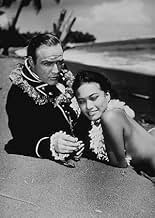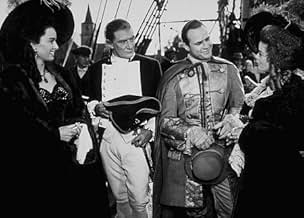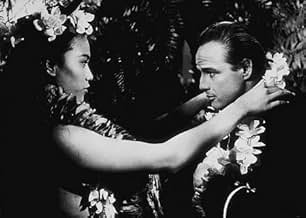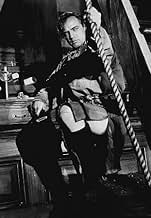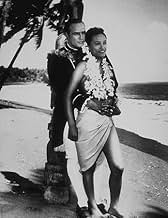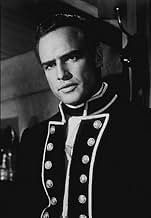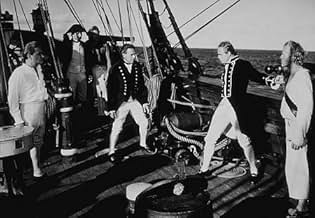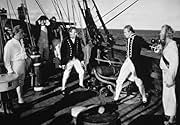In 1787, British ship Bounty leaves Portsmouth to bring a cargo of bread-fruit from Tahiti, but the savage on-board conditions imposed by Captain Bligh trigger a mutiny led by first officer ... Read allIn 1787, British ship Bounty leaves Portsmouth to bring a cargo of bread-fruit from Tahiti, but the savage on-board conditions imposed by Captain Bligh trigger a mutiny led by first officer Fletcher Christian.In 1787, British ship Bounty leaves Portsmouth to bring a cargo of bread-fruit from Tahiti, but the savage on-board conditions imposed by Captain Bligh trigger a mutiny led by first officer Fletcher Christian.
- Nominated for 7 Oscars
- 3 wins & 13 nominations total
Featured reviews
I can understand that some viewers balk at Marlon Brando's affected foppishness. IMO, however, the actor is taking a calculated risk in attempting to illustrate the profound transformation that Fletcher Christian undergoes as the story progresses. It does not always ring true, but, taken as a whole, it works very well. Some moments are brilliant. By the time we reach the actual mutiny, his growing rage (which has been suppressed almost imperceptibly up to this point) explodes in a massive rush and instantly we see a side of Christian that we weren't quite sure existed. His self-serving has finally given way to inevitable sympathy for the much-abused crew and even a sort of new-found idealism.
However, it is Trevor Howard's performance as Lt. Bligh which is the backbone of this movie. This man IS Bligh. At first he seems approachable and even affable, but each succeeding scene reveals some new brush stroke of character that illustrates the single-minded, ruthless soul of stone contained within. Howard also has this playfully mischievous smile that, every now and then, leads you to believe that there may be some glimmer of warmth inside the man. This hope, of course, is dashed to pieces every time.
"Mutiny on the Bounty" is also a strong example of how a soundtrack can make a film. This music always gives me goosebumps. From the overture through intermission to closing, it sets the tone of the picture brilliantly as a seafaring drama/adventure. It sounds like the ocean. It sounds the way the cinematography looks. Vast panoramas of blue ocean, endless skies, lush green tropical islands, and, most of all, the ship itself (which was built specifically for this film). And the icing on the cake is the song "Follow Me", one of the most hauntingly beautiful melodies ever written for the screen. To me (here I go again), it sounds like Tahiti.
Watch "Mutiny on the Bounty" in letterbox and full stereophonic sound and THEN see if you don't like it.
I liked this 'Mutiny On The Bounty' better than the critics did, who got annoyed at Marlon Brando's British accent. I found nothing wrong with it and I usually am critical about that sort of thing myself. Brando gave a solid performance.
Trevor Howard was convincing as the sadistic "Captain Bligh" and Tarita was fair as the love interest "Maimiti." The cinematography might have been the best feature of the film, a definite movie for widescreen as a lot of these mid '50s-to-mid '60s films were. There are some beautiful shots in here, beginning with those Tahiti sunsets. The color in this movie is magnificent.
Although not particularly a film you might watch over and over, I found no major fault with it except for perhaps the romance which was a bit sappy. The adventure, acting and photography were all top-notch and the three hours went by fairly fast.
Furthermore, there are two fascinating performances by Marlon Brando and Trevor Howard. Howard is not quite as showy in the role as the scenery-chewing Laughton but his characterization is a bit more complex. Brando does an excellent job as Christian, posturing in the manner of a gentleman and speaking with an upper crust British accent that is entirely credible. Indeed, when he reaches the mutinous moment in a rage of uncontrolled anger, he is at the top of his acting form. Even so, some of his most effective moments are quietly underplayed. His performance deserved an Oscar nomination--but with so much bad publicity surrounding the film and the hardships and strains involved in the making, Hollywood apparently gave him the cold shoulder. Years later, they did the same to Russell Crowe for his bad boy behavior.
Technically, of course, the film is far superior to the B&W 1935 Gable-Laughton film. Gorgeous sunsets are backdrops to the ship at sea and the island scenes in Tahiti are gorgeous to behold.
A missing element from the earlier film is the absence of the character played by Franchot Tone. Indeed, Tone was nominated for a Best Actor award, along with Gable. There are numerous other differences but this take on the story is a good one, every bit as valid as the 1935 film.
With all of the bad publicity surrounding the film relegated to the past, we can look at this film with a fresh viewpoint today and enjoy it for the entertaining blockbuster that it is. Highly recommended.
All of these elements help to elevate the core story in Mutiny on the Bounty: Bligh and Christian. As Bligh, Trevor Howard changes the character immortalized by Charles Laughten in the 1935 version. Instead of inhuman, demonic tyrant, Howard portrays Bligh simply as an excruciatingly stern captain focused(a little overzealously) on doing the best job that he can. If his mean do not pursue his goals with the same fervor. He gets impatient then frustrated then angry and then violent all in quick succession. He makes for a very realistically workaholic without a life, and he wants everyone else to be a workaholic, too. I thought Clark Gable's Fletcher Christian could not be topped...until I saw Marlon Brando undergo a sheer transformation playing the role. After seeing Brando in ON THE WATERFRONT and the equally American THE GODFATHER, I could not imagine him playing 18th Century British officer...but he did. Brando perfects the haughty, posturing walk. He perfects the clipped, accented speech. He perfects the foppish, effeminate walk of a "true" English gentlemen of high-born connections. Brando does it so remarkably well that one cannot imagine such sissified character leading a mutiny against a tyrannical man like Bligh. Brando's transformation of Christian from sissy to mutiny leader baffles. Unlike Gable, he doesn't gloss over the decision to be a mutineer. Gable made it look easy and as the "right thing to do". Realistically, is it the right thing to do? To throw away your career that you worked hard for? To throw away your life? All for the sake of a feeling a moral belief? It may sound hard, but when faced with a such a delimma, it can be agonizing...which is exactly what Brando captures to a tee, right down to the last frame.
Mutiny on the Boutny 1962 truly needs to be seen. Please don't listen to critics. This movie is fantastic.
Did you know
- TriviaThe ship built for the film sank in the Atlantic Ocean after taking on water on October 29, 2012 during Hurricane Sandy off of the East Coast of the United States. It was last seen with only the masts standing above the water. Two of the crew died: the Captain, Robin Walbridge, and Claudene Christian, the direct descendant of Fletcher Christian.
- GoofsThe actual mutiny did not happen in the manner portrayed in the film. Christian and the other mutineers actually took the ship in the early hours of the morning, while Bligh and almost everyone else was asleep.
- Quotes
Fletcher Christian: [to Captain Bligh] You remarkable pig. You can thank whatever pig god you pray to that you haven't turned me into a murderer.
- Alternate versionsThe original 1962 print had a different opening scene, in which a ship's crew lands on Pitcairn and discovers an artifact belonging to the H.M.S. Bounty. They can barely read the name until William Brown (Richard Haydn), now aged, appears on the beach and says "Bounty". He then proceeds to tell the story of the famous mutiny, of which he is apparently the last surviving member. That is why we hear his voice narrating the story. In all current prints, including the one shown on Turner Classic Movies ca. 2005, this opening scene is omitted, so we do not know why Brown is telling the story in voiceover. However, the scene has been restored on the 2006 DVD release.
- ConnectionsFeatured in Hollywood: The Fabulous Era (1962)
Details
- Release date
- Country of origin
- Languages
- Also known as
- Motín a bordo
- Filming locations
- Bora Bora, Leeward Islands, French Polynesia(first breadfruit collecting party)
- Production company
- See more company credits at IMDbPro
Box office
- Budget
- $19,000,000 (estimated)
- Runtime
- 2h 58m(178 min)
- Aspect ratio
- 2.76 : 1


